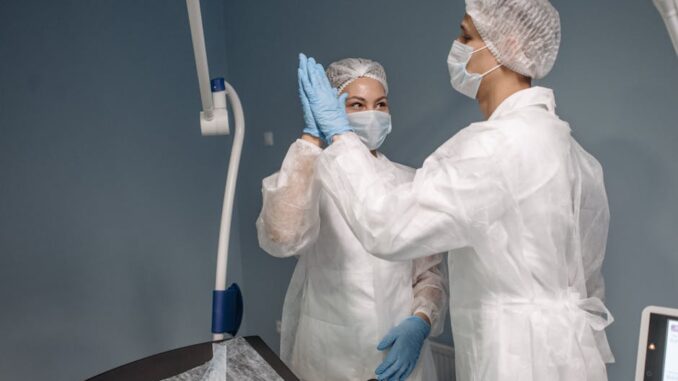
Summary
This article explores the transformative impact of Artificial Intelligence (AI) on the healthcare ecosystem, from diagnostics and treatment to drug discovery and remote patient monitoring. AI is poised to address critical challenges like healthcare accessibility and workforce shortages, ultimately leading to improved patient outcomes and a more efficient healthcare system. As AI continues to evolve, its integration into healthcare promises a future of personalized, predictive, and precise medicine.
Healthcare data growth can be overwhelming scale effortlessly with TrueNAS by Esdebe.
Main Story
The healthcare world, it’s changing, and it’s changing fast. What’s fueling this dramatic shift? Well, it’s largely due to the rapid advancements in Artificial Intelligence, or AI. AI isn’t just a futuristic fantasy anymore; it’s becoming fundamental to modern medicine. It’s offering solutions to really tough, long-standing problems and, ultimately, paving the way for better patient results. Think about it, from how we diagnose and treat illnesses to the discovery of new drugs and even remote patient monitoring, AI is really shaking things up in the healthcare field. And it’s happening at an unprecedented pace.
One of the most important areas where AI is making a difference? It’s its potential to tackle the growing global health accessibility gap. We’re talking about billions of people who don’t have access to basic services, and the projections are showing a shortage of millions of healthcare workers in the coming years. It’s a tough situation. AI-powered solutions, though, offer some genuine hope. Take telehealth platforms, for example. These platforms are powered by AI and they can extend care to remote areas, places that have been historically underserved, connecting patients with specialists and getting them medical interventions when they need them. This ability to bridge those geographical barriers, and to get over those staffing issues, is really critical if we’re ever going to achieve universal health coverage and ensure that everyone has access to the same high-quality of care.
Now, let’s talk about diagnostics. Here, AI is really proving to be a game-changer. You see, AI algorithms are able to analyze complex medical images, like CT scans and X-rays, with incredible accuracy. Sometimes, they’re even better than us at spotting those subtle anomalies, those early signs of disease. This not only speeds up the diagnosis process, but it also improves accuracy, leading to more effective treatments. I remember reading a story about a hospital in London that uses AI to prioritize cases in the ER, allocating resources more efficiently and ultimately saving lives. It was amazing!
Beyond diagnostics, AI is fundamentally changing how we approach treatment and patient care. For instance, AI-assisted robotic surgery is becoming more and more common, allowing surgeons to do really complex procedures with greater precision and minimally invasive techniques. Additionally, you’ve got AI-powered systems constantly monitoring a patient’s vital signs, alerting clinicians to any potential problems so they can take proactive steps. This continuous monitoring is particularly valuable in critical care, where being able to detect any deterioration early on can significantly improve the outcomes.
It’s not just about the clinical setting, AI is making huge strides in medical research and drug development. AI algorithms are now able to analyze huge sets of patient data, research findings and even clinical trial results to spot patterns, predict treatment outcomes, and help us develop new therapies faster. This data-driven approach is revolutionizing the field, making drug discovery faster, more efficient, and more affordable. That said, AI is also facilitating the development of more personalized medicine, tailoring treatments for people based on their own unique genetic makeup and medical history. It’s all pretty impressive if you ask me.
While AI’s integration into healthcare is still in its early days, you really can’t deny the potential that it holds. It’s important to remember, though, that AI isn’t intended to replace healthcare professionals; instead, it’s designed to augment their abilities, giving them the time to focus on more complex tasks, and that much needed human interaction. By automating tasks, providing real-time data and enhancing our ability to diagnose and treat illness, AI is giving healthcare providers the tools they need to deliver better care. I think that’s something we all want.
So, as AI technology continues to evolve, its role in healthcare will only continue to grow, you know? The future of healthcare is inextricably linked to AI, promising a new era of more personalized, predictive, and precise medicine. With its ability to tackle critical challenges, and ultimately improve patient outcomes, AI is poised to revolutionize how healthcare is done, and change how we approach health and well-being. And frankly, I can’t wait to see what the future brings.


So, AI in healthcare is like that super-organized friend who actually manages to make sense of my messy medicine cabinet, and probably tells me to take the vitamins I forgot about.
That’s a great analogy! I think the ‘organized friend’ aspect really highlights how AI can bring structure to complex medical data and processes, not just your medicine cabinet. It can certainly improve our focus on preventative care too.
Editor: MedTechNews.Uk
Thank you to our Sponsor Esdebe – https://esdebe.com
The potential for AI in drug discovery, particularly its ability to analyze vast datasets to accelerate the development of new therapies, is particularly exciting and promising.
I agree, that’s an incredibly promising aspect! The ability of AI to sift through such large datasets to find patterns and connections is definitely accelerating drug discovery, and I think will lead to more effective treatments and faster development cycles.
Editor: MedTechNews.Uk
Thank you to our Sponsor Esdebe – https://esdebe.com
So, we’re trusting algorithms to prioritize ER cases *and* diagnose subtle anomalies now, are we? I wonder, who audits the auditors when they go rogue and start diagnosing everyone with the same rare disease?